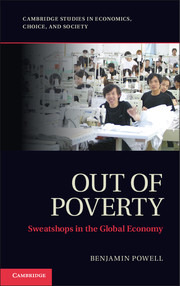Book contents
- Frontmatter
- Contents
- Figures
- Tables
- Acknowledgments
- Preface
- 1 Introduction
- 2 The Anti-Sweatshop Movement
- 3 The Economics of Sweatshop Wage Determination
- 4 Don’t Cry for Me, Kathie Lee
- 5 Health, Safety, and Working Conditions Laws
- 6 Save the Children?
- 7 Is It Ethical to Buy Sweatshop Products?
- 8 A History of Sweatshops, 1780–2010
- 9 The Process of Economic Development
- 10 What Good Can Activists Do?
- 11 Conclusion
- References
- About the Author
- Index
- References
7 - Is It Ethical to Buy Sweatshop Products?
Published online by Cambridge University Press: 05 June 2014
- Frontmatter
- Contents
- Figures
- Tables
- Acknowledgments
- Preface
- 1 Introduction
- 2 The Anti-Sweatshop Movement
- 3 The Economics of Sweatshop Wage Determination
- 4 Don’t Cry for Me, Kathie Lee
- 5 Health, Safety, and Working Conditions Laws
- 6 Save the Children?
- 7 Is It Ethical to Buy Sweatshop Products?
- 8 A History of Sweatshops, 1780–2010
- 9 The Process of Economic Development
- 10 What Good Can Activists Do?
- 11 Conclusion
- References
- About the Author
- Index
- References
Summary
The standard economic defense of sweatshops holds that sweatshop jobs should not be jeopardized because they are better than the other alternatives workers face. Is that enough to make it ethical for companies to offer jobs with such low pay and poor working conditions, and for us to buy their products? Economist Ludwig Von Mises made a moral claim that many economists, who have defended sweatshops, have implicitly endorsed his defense of factory owners of the industrial revolution, writing: “It is deplorable that such [impoverished] conditions existed [outside the factories]. But if one wants to blame those responsible, one must not blame the factory owners who – driven by selfishness, of course, and not by ‘altruism’ – did all they could to eradicate the evils. What had caused these evils was the economic order of the precapitalistic era.” Is he right that firms are not blameworthy for taking advantage of the poverty caused by the prior economic order? The poverty that leads workers to choose sweatshops today is often caused by background injustices that are not the direct fault of the firm. This raises many important ethical questions.
Are we unfairly exploiting sweatshop workers when we buy products made with their labor? Do we benefit a great deal whereas they get only a pittance? Many people experience moral outrage when others buy products made in sweatshops, but that same moral outrage is seldom directed at those who do not give charitably to impoverished subsistence farmers throughout the world. Why? The subsistence farmers are often poorer and more in need of our help. By trading with sweatshop workers, do we take on a moral responsibility to do something more for them than the responsibility we have to other poor people with whom we do not trade? If the lack of good alternatives is the result of grave injustices, are people who deal with sweatshop workers obligated to try to correct these injustices? These ethical concerns are important because they may lead you to feel “dirty” for buying sweatshop products even if you believe the economic arguments in the preceding chapters.
- Type
- Chapter
- Information
- Out of PovertySweatshops in the Global Economy, pp. 97 - 111Publisher: Cambridge University PressPrint publication year: 2014



